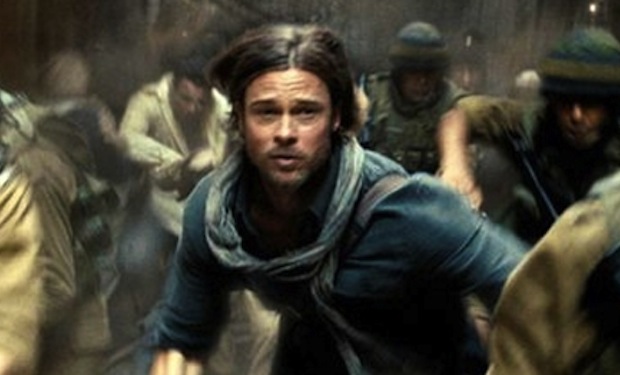By Armond White
World War Z ends with Brad Pitt’s voiceover cautioning “The war has just begun.” That could also be a disgruntled producer-star warning about the current state of film culture which has found a new low level of gullibility.
 Add the disaster of World War Z to complaints about the superb Man of Steel; it shows the unprecedented diminishment of cultural standards where people want what they’ve already bought before: the unserious yuckster crap of the past. That’s why the dismal Iron Man movies are the most praised of all summer blockbusters; they offer no challenge while Man of Steel’s serious fun (visual ingenuity and emotional power) are almost completely misunderstood.
Add the disaster of World War Z to complaints about the superb Man of Steel; it shows the unprecedented diminishment of cultural standards where people want what they’ve already bought before: the unserious yuckster crap of the past. That’s why the dismal Iron Man movies are the most praised of all summer blockbusters; they offer no challenge while Man of Steel’s serious fun (visual ingenuity and emotional power) are almost completely misunderstood.
We’re at Cultural Ground Zero–the point where Hollywood has obliterated its own past achievements just to sell more product. World War Z demonstrates this by combining the formula for TV’s The Walking Dead series with the apocalyptic snark cinema of Children of Men. Pitt plays Gerry Payne, a government operative experienced in Libya and Chechnya and forced to fight a global pandemic of zombism. It’s a gimmick of fan boy naivete, as if nobody connected with World War Z had seen 28 Days, 28 Days Later, 28 Days’ Mama or any other zombie flick.
World War Z starts from stupid scratch, mixing global catastrophe with silly pseudo-science about viruses and bacteria and anything goes.
“Mother Nature is a serial killer. She wants to get caught,” an expert pathologist informs Payne. The plot goes from ecology to atheism as Payne, wearing a blue Kabbalah wrist rope bracelet, travels from Philadelphia to New Jersey, to New York, to Korea and Israel to fight the epidemic. He witnesses CGI horrors of multitudes in chaos evoking the pandemonium of either revolution or holocaust.
It’s part of a casual, insulting attempt at political commentary where Zombie hoards = radical Islamic terrorists, somehow equating the mindless urge to devour and destroy with the desperation of non-believers–or else junk science. There’s even a mysterious Bengazi-style government memo. (“An e-mail, not a memo. Nobody read it.”) Yet none of this topical stuff matters as much as the inept filmmaking. Director Marc Forster features the same insensitivity he brought to Monster’s Ball, Finding Neverland, Stranger Than Fiction and The Kite Runner. His 3D imagery foregrounding unimportant objects distracts from a viewer’s concentration.
Pitt’s another victim of cultural ground zero who apparently didn’t know enough to hire a director skilled at the zombie genre. Hasn’t Pitt seen any of Paul W.S. Anderson’s Resident Evil spectaculars? But who knows if Anderson could overcome the sloppy storyline and character development in the script that resulted from five of the worst screenwriters in contemporary Hollywood: Matthew Michael Carnahan (The Kingdom), J. Michael Straczynski (Changeling), Drew Goddard (Cloverfield), Damon Lindelof (Prometheus) and SNL comedy writer Max Brooks who also word-processed the source novel. Pitt ends the film in hero mode, offering some intimate expressions of sacrifice, but nothing can camouflage the film’s emptiness, that lack of conviction or connection between shots that signifies failure.
Follow Armond White on Twitter at 3xchair
